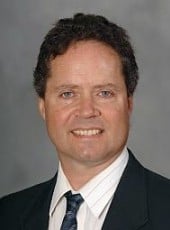Online Education for Working Professionals
Design best management practices for water systems.

Enhance the resilience and sustainability of society's water infrastructure.
Learn to analyze, design, and manage water and sewer systems, stormwater, low impact development, and stream restoration projects. Recognize the necessity of resilient infrastructure for our society facing challenges due to urbanization and climate change. Examine environmental and economic issues related to dams, embankments, diversions, and cross drainage. Study levees, flood risk management, and restoration of rivers to a more natural state. Environmental engineering jobs pay a mean annual wage of $110,570 (U.S. Bureau of Labor Statistics).
-
Figures from U.S. Bureau of Labor Statistics (BLS), dated May 2024.
3 courses in 3 semesters.
| Department | Civil, Environmental, and Geospatial Engineering |
|---|---|
| Admissions requirement | Civil engineering, environmental engineering, or related degree. |
| Contact | Angela Keranen |
| Length | 3 courses in 2-3 semesters |
|---|---|
| Effort | 3 hours per credit per week |
| Each course | 3 credits |
| Total credits | 9 |
| Course type | Online or on-campus |
| Modality | Watch class recordings on demand |
| Cost | Based on credits and course type |
| Already enrolled? | Speak with your advisor |
Curriculum
Progress quickly with a compact curriculum. Work with the program advisor to select courses that fit your interests and prerequisite skills.
Prerequisites
Check your preparation. Students without civil, environmental, or related degree should have taken CEE 3620 Water Resources Engineering (4 credits including the lab or equivalent) OR CEE 3650 Hydraulics and Hydrology.
Electives
Take 9 credits of elective courses. Take 3 out of the 4 courses.
Typical Schedule
The minimum completion time is two semesters. Here are typical schedules.
Option A
| Fall | Spring |
|---|---|
| CEE 5650 |
CEE 5507 |
| Summer | |
| CEE 5640 |
Option B
| Fall | Spring |
|---|---|
| CEE 5650 | CEE 5507 and CEE 5665 |
Option C
| Spring | |
|---|---|
| CEE 5507 or CEE 5665 |
|
| Summer | Fall |
| CEE 5640 | CEE 5650 |
Option D
| Spring | Summer |
|---|---|
| CEE 5507 and CEE 5665 |
CEE 5640 |
Option E
| Summer | |
|---|---|
| CEE 5640 | |
| Fall | Spring |
| CEE 5650 | CEE 5507 or CEE 5665 |
Application Process and Admissions Requirements
Applications are reviewed on an individual basis using a holistic approach. Fill out our free graduate application online to apply to any of our programs. Official transcripts and scores are not required for the initial application, although you will need to upload them later.
Interested in taking a single, online course? Enroll as a non-degree seeking student.
Upon completion of the certificate, students will be able to:
Design resilient water infrastructure systems.
Michigan Tech was founded in 1885.
The University is accredited by the Higher Learning Commission and widely respected by fast-paced industries, including automotive development, infrastructure, manufacturing, and aerospace. Michigan Tech graduates deliver on rapid innovation and front-line research, leaning into any challenge with confidence.
The College of Engineering fosters excellence in education and research.
We set out as the Michigan Mining School in 1885 to train mining engineers to better operate copper mines. Today, more than 60 percent of Michigan Tech students are enrolled in our 17 undergraduate and 29 graduate engineering programs across nine departments. Our students and curriculum embrace the spirit of hard work and fortitude our founders once had. Our online graduate courses are the same, robust classes taken by our doctorate and masters candidates, taught directly by highly regarded faculty, with outstanding support from staff. We invite working professionals to join these courses, bring their own experience and challenges as part of the discussion. Leverage the national reputation of Michigan Tech to advance your career in tech leadership.
Online Certified Instructors
Meet the online certified instructors. Students have the flexibility to review class recordings later.

Brian Barkdoll, PE, BCEE
Professor, Civil, Environmental, and Geospatial Engineering
Teaching Statement
Dr. Barkdoll teaches courses in water resources engineering, hydraulic structures, water distribution and wastewater collection, and stream restoration.

David Watkins, PE
Distinguished Professor, Civil, Environmental, and Geospatial Engineering
Teaching Statement
My goal is to provide a safe, exciting, and challenging learning environment for all students. I believe that many students are motivated to learn basic principles through practical application, and thus I frequently use problem-based learning methods and case studies in my courses. In nearly all my courses, students complete independent term projects so that they can dive deeper into topics of their choice. I also welcome guest speakers from industry and government, and I recognize the need for continuous professional development to stay up to date in the field of water resources engineering.

Veronica Webster, PE
Associate Professor, Civil, Environmental, and Geospatial Engineering
Teaching Statement
Dr. Webster teaches uncertainty analysis, advanced hydrology, probabilistic analysis and reliability, environmental engineering, and water resources engineering.